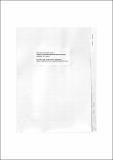| dc.contributor.author | Mwabu, Germano M. | |
| dc.date.accessioned | 2011-12-09T16:22:13Z | |
| dc.date.available | 2011-12-09T16:22:13Z | |
| dc.date.issued | 1987-08 | |
| dc.identifier.citation | Mwabu, Germano M. (1987) Health sector financial analysis: a survey. Working paper no. 452, Nairobi: Institute for Development Studies, University of Nairobi | en_GB |
| dc.identifier.uri | https://opendocs.ids.ac.uk/opendocs/handle/20.500.12413/1311 | |
| dc.description.abstract | 'Health for All' will not be achieved by the year 2000 unless additional resources are recruited for health sectors of developing countries. The unmet needs for basic health care cannot be satisfied through better use of the existing health resources alone. The most premising domestic sources of additional health resources are the user fees, and uncommitted community resources. Uncommitted community resources are incomes of communities which are not committed to the provision of basic needs, or to investments that are necessary to sustain existing standards of living.
Foreign exchange is a vital input in the provision of health services in developing countries. Mobilization of domestic resources for health sectors without increasing their foreign exchange inputs could lead to a fall in the quality of health services due for example to shortages in drugs. Ways of increasing supply of foreign exchange to health sectors of developing countries should be explored.
Since Ministries of Health must make decisions regarding how much of various quantities of health services to provide before they actually receive their budgets, it is important for them to have a method of forecasting their budgets to avoid planning health activities that are not feasible. The paper contains a revenue prediction model that should be useful in planning and allocating budgets of the Ministries of Health.
Two types of costs should be considered in designing health care delivery systems - costs of providing health services, and patients’ costs of using the services. The appropriate or cost-effective health care system is the System that minimizes the sum of these costs. It is argued in the paper that compared to alternative systems, a community based health care system in which the Government and the community share recurrent costs of health services is the most cost-effective system. Cost-sharing arrangements in such a system would include service fees, labour time contributions, prepayments for health services and community managed drug funds. | en_GB |
| dc.language.iso | en | en_GB |
| dc.publisher | Institute for Development Studies, University of Nairobi | en_GB |
| dc.relation.ispartofseries | Working Papers.;452 | |
| dc.rights.uri | http://creativecommons.org/licenses/by-nc-nd/3.0/ | en_GB |
| dc.subject | Finance | en_GB |
| dc.subject | Health | en_GB |
| dc.title | Health sector financial analysis: a survey | en_GB |
| dc.type | Series paper (non-IDS) | en_GB |
| dc.rights.holder | Institute for Development Studies, University of Nairobi | en_GB |
| dc.identifier.blds | 14109 | |


